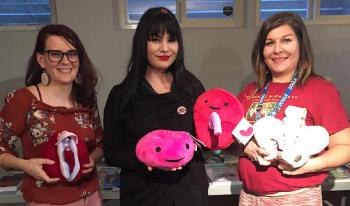Image Caption
By Paula E. Kirman
Windspeaker.com Contributor
Edmonton
Indigenous Birth of Alberta and the Native Youth Sexual Health Network hosted 15 Indigenous people in Edmonton for full spectrum doula training.
The training took place from Nov. 5 to 11 and covered culturally safe supports for reproductive health and pregnancy outcomes, including menstruation, birth and early post-partum; loss and miscarriage; survivors of violence; sexually-transmitted infections, and substance use, just to name some of the topics.
“Indigenous communities all across North America are working to reclaim birthing, menstruation, LGBTTQQIA+ support, and other sexual and reproductive health teachings and spaces,” explained Erin Konsmo with Native Youth Sexual Health Network.
“Alberta has not had a by (or) for Indigenous space of training for doulas in the past, yet a great need for support for people who are pregnant exists. We had over 70 Indigenous people apply to attend this training from various places across Alberta.”
Participant Simone Blais (Métis/Trini from Manitoba) said "There is a big demand for these kinds of trainings in communities and there's a huge lack in the mainstream doula trainings for traditional knowledge and safe spaces for Indigenous peoples.”
Konsmo said participants were trained as "full spectrum" Indigenous doulas.
The training featured a series of different facilitators and knowledge keepers who joined the participants throughout the week, such as Mary Cardinal Collins of Saddle Lake First Nation, a Cree language speaker who taught participants about the Cree words for birth, placenta, breastfeeding, and Jo-Anne Saddleback, an Elder who spoke about rites of passage for young people, such as traditional teachings about menstruation.
The Edmonton's H.E.R program was also a part of the training.
“The program was developed by Streetworks to provide support for street-involved women in Edmonton... They work from a harm reduction framework to support people who are pregnant, many of whom are also Indigenous,” Konsmo explained.
Traditional teaching surrounding sexuality and birth are necessary for both health and identity.
"This is particularly important for Indigenous communities in terms of sovereignty and reclaiming our roles and space. This is important for Indigenous people in terms of being a healthy person and raising helping people," said participant Tanya Kappo of Sturgeon Lake Cree Nation.
Freedom, a participant who recently gave birth to a son, her second child, used a natural birthing pool and Indigenous cultural support. This is in contrast to the birth of her now two-and-a-half-year-old daughter, who was born in a hospital.
“I feel the natural way and Indigenous way was more comfortable and safer than being in a hospital and having doctors and nurses in an institutional setting,” she said.
The week ended with a social evening, which included Cree lullabies, women’s drumming and mingling with community members and Indigenous doulas and midwives.
Participants will return to their communities able to share their support and knowledge.
"I hope that participants take away practical skills and self confidence to continue to support their communities, including young people, through all reproductive life events.
That can encompass anything from menstruation, puberty, sexuality, pregnancy, child parenting, and even end of life care,” said Krysta Williams, Advocacy & Outreach Coordinator at the Native Youth Sexual Health Network.
“Our goal is to continue to build on Indigenous birth justice knowledge to serve as an introduction for what full spectrum doula work can look like in our communities, both as a reclamation of tradition and an ongoing response to new health care challenges.” Konsmo said.
“The gathering will introduce various frameworks for support throughout the spectrum of clinical, community, and peer-led initiatives.”
There has been other Indigenous full spectrum doula training held in Ottawa and Toronto, and the organizations will continue to support more training when invited.
“We are currently encouraging all levels of health organizations and communities to consider supporting the resurgence of Indigenous doulas and birth workers to be supported to work in their communities,” said Konsmo.
“We are able to host more Indigenous doula trainings in areas where support and resources exist.”
Any communities or organizations wanting to partner or wanting to know more can contact the Native Youth Sexual Health Network or Indigenous Birth of Alberta. Currently this training is grassroots, peer-based, knowledge sharing models.
To contact the organizations:
Indigenous Birth of Alberta - Email: mailto:indigenousbirthalberta@gmail.com
Facebook: Indigenous Birth Alberta
Native Youth Sexual Health Network http://www.nativeyouthsexualhealth.com
Twitter: @NYSHN
Facebook: Native Youth Sexual Health Network

